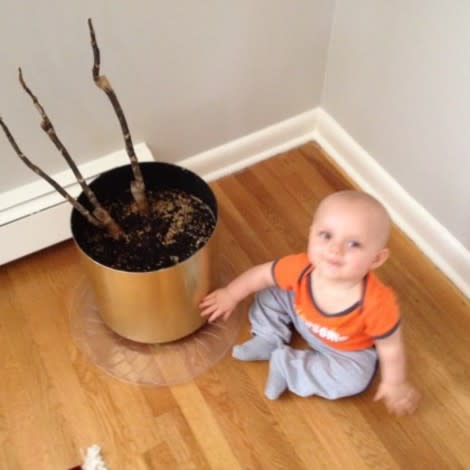Why Do Dead Plants Make Babies Smile?

There's a dead, leafless plant in the corner of my living room. I haven't discarded it yet because its pot is heavy and hard to move. Besides, I have better things to do, like pose my baby next to said pot and snap photos, like the one you see here.
I never really gave much thought to the fact that my son is smiling in this photo. He's generally a happy guy and, being a baby, I figured he probably didn't realize that a dead house plant shouldn't necessarily warrant a grin.
But the results of a recent study gave me pause--maybe, just maybe, he was smiling out of relief. Maybe he was actually happy that the plant has met its maker... because he KNOWS that plants can't be trusted!
Yale University psychologists Annie Wertz and Karen Wynn have found that infants take an average of five seconds longer to touch plants than other objects put before them, according to a study published in the January 2014 issue of the journal Cognition.
Wertz and Wynn believe that this tendency has an evolutionary basis--it's "a default strategy that can be overturned with information from other people that a particular plant is safe to eat or use for some purpose," according to a statement on Yale's website.
In other words, it's tough to tell whether a plant is poisonous or prickly, but if mom touches or eats it, then baby can safely assume that it's not a hazardous species--which may have been a big deal during humans' hunter-gatherer days.
Even though we don't really worry about plants today, "(w)hen you think of humans in their historically natural environment, plants were a huge part of their lives," Wertz said.
For babies, keeping away from plants may be, as The Atlantic put it, "a remnant of an ancient survival mechanism."
Related: Children and Time: What They-Usually-Know and When
The magazine reported that the psychologists' study was based on the following experiment: Infants were presented with real plants, artificial plants and objects that didn't resemble plants at all. Of 47 babies, 45 took longer to touch the real and fake plants than the other object. (The psychologists also ran a couple of other experiments that ruled out the possibility that the object they had chosen was so attractive that its allure--rather than a reluctance to touch plants--was what drove the babies' actions.)
I wondered: Would my infant respond in the same way? I didn't have a fake plant to work with, so I settled for two non-plant objects--a hairbrush and an oven mitt--and one house plant that I've (miraculously) managed not to kill.
The first couple of times I plopped him in front of this random trio, he ignored them and, instead, made a beeline to some toys in the corner of the room. (Clearly, I'll have to do a better job tidying my living room if I ever want to run a true scientific experiment.) But the third and fourth time, he reached for the hairbrush, running his fingers across its bristles--despite the fact that the leafy plant in front of him, arguably, could have provided just as much tactile stimulation.
Well, that was good enough for me--clearly the Yale folks are on to something!
Of course, there's a danger that their findings may be misinterpreted. For instance, don't assume that you can decorate the inside of your baby's crib with your favorite fern without anything going awry.
"We are in no way claiming that infants can be left alone with plants or anything like that," Wertz told The Atlantic.
There's also the very important question of whether dead plants bring wary babies joy as my son's reaction seemed to indicate. Perhaps that's a hypothesis for a future study?
Your move, Yale.
- Alice Gomstyn
For 8 reasons the great outdoors is good for Baby, visit BabyZone!
MORE ON BABYZONE
Your toddler is smarter than you think
Toddlers who play with their food may be faster learners
Parasites in sandboxes: should parents worry?

